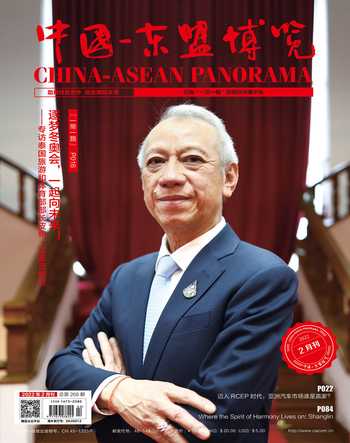后疫情時代下,中國—東盟應如何攜手化“危”為“機”?
關秋韻


自新冠肺炎疫情暴發以來,中國—東盟區域不僅是遭受疫情沖擊較早的地區,也是最先開展國際合作共同應對疫情挑戰并取得成績的地區。然而,隨著“后疫情時代”有望到來,面對復雜的國際形勢,中國—東盟需要應對哪些新的挑戰?新機遇能否在雙方共克時艱中萌生?中國與東盟又能否攜手應對挑戰,化“危”為“機”呢?
在近期舉行的第十三屆中國—東盟智庫戰略對話論壇(以下簡稱智庫論壇)上,與會嘉賓圍繞這些問題展開了深入探討。
前路并非坦途
長遠來看,中國—東盟關系總體保持健康穩定地發展,但前路并非一片坦途。其中,域外國家對國際局勢的影響是最主要的外部挑戰,如何應對域外國家的負面影響,已經成為中國—東盟關系發展無法回避的重要問題之一。
“某些西方大國目前正大力推進‘印太經濟框架,以四邊機制為主要平臺,圍繞貿易、經濟、科技以及有韌性的供應鏈、減碳、清潔能源、基礎設施調控標準等方面,在中國和東盟之間打入其他的經濟援助,中國在該領域的合作項目可能會因為這些干擾和阻礙出現變數。若這個框架向湄公河流域滲透,形成海陸并進的態勢,東盟未來‘選邊站的壓力會不斷增大。”北京大學國際關系學院教授、泰國法政大學比里·帕儂榮國際學院特聘教授楊保筠分析稱,“但亦不必過度擔心,東盟國家對于任何帶有遏制排他性的政策都十分地警惕,與中國合作共贏始終是東盟各國的一個戰略共識。”
“我們也需關注東南亞民眾對華認知的變化,疫情暴發后,東南亞國家內部不同社會群體對華認知出現了一些差異。”四川省社會科學院印度研究中心副主任陳吉祥表示。
一方面東盟國家與民眾對中國的表現予以積極評價。根據印尼外交政策協會發布的《2021年度中國—東盟關系民調報告》來看,東盟10國中67%的受訪者認可或者強烈認可中國和東盟的緊密合作,相信這能夠幫助東南亞分擔疫情的沖擊;但另一方面,也有一些民眾對于大量使用中國疫苗表示顧慮,而這些無疑都需要雙方進一步地增信釋疑。
“加之新冠肺炎疫情對雙邊的人文交流造成了一定的影響,中國—東盟的人員往來受阻,包括旅游和商務往來人數都急劇減少,雙方留學生也無法到對方國家正常學習,很多對話交流只能通過線上來進行,長此以往并不利于雙方,尤其是民間民眾增進了解。”陳吉祥補充說道。
化“危”為“機”,中國—東盟應攜手應對
隨著后疫情時代的機遇與危機一一顯現,“緊抓機遇”“加強合作”成為中國—東盟攜手應對挑戰的關鍵詞。那么想要化“危”為“機”,中國—東盟合作路在何方?
在中國東南亞研究會會長、廣西八桂學者莊國土看來,加強雙方戰略協調,增進政治互信是中國—東盟抵御外界政治威脅的重要力量。雙方應強化高層戰略對話與政策溝通,把中國的發展戰略和東盟國家的發展戰略相互嵌入與深度對接,凝聚起更多共識。
“夯實民意基礎也是雙方需要努力的方向。”中國—東盟商務理事會執行理事長、RCEP產業合作委員會主席許寧寧說,政治互信來自于民意基礎,經濟合作也離不開民意基礎,要下足功夫做民心相通,推動民意基礎的改善。在遵守民心相通規律的前提下,充分發揮社會民間的力量,包括智庫、青年教育、媒體、文化等領域的合作,增進相互了解與相互信賴。
楊保筠則認為,后疫情時代下,加強疫情防控、加快疫苗研發和生產依舊是保障各領域良好穩定發展的首要任務,也是最終決定能否戰勝疫情的關鍵。
“首先,我們需要積極與東盟國家開展疫苗研發合作,以實際行動促進疫苗的可及性和可負擔性,幫助東盟戰勝疫情。其次,合作建立完善的中國—東盟公共衛生安全合作新秩序,實行輪值主席國制度,重大問題表決決定。最后,盡快啟動中國—東盟公共衛生應急聯絡網,組織實施中國—東盟公共衛生行政人員培訓班等項目,協助東盟國家加強衛生能力建設。”楊保筠說。
而面對經濟復蘇這一時代命題,老撾社會與經濟科學院企業發展政策與國際融合研究中心副主任、研究員馮薩萬·西提德斯說:“疫情暴發以來,數字經濟新產業、新業態不斷涌現,成為推動經濟復蘇的重要引擎。加強創新、信息技術產業開發將成為東盟各國政府圍繞新一輪科技產業制高點、培育新經濟動力的重要出發點,在不久的將來,老撾希望可以與中國在中國—東盟合作框架下進行數字領域的合作和協作。”她強調,在穩固中國—東盟經貿合作的基礎上培育經濟新模式,不僅有助于激活后疫情時代的經濟增長,還將增加東盟抵御外界經濟威脅的能力。
“后疫情時代下,中國和東盟面臨困難與挑戰不可避免,但只要雙方攜手應對,共克時艱,團結合作,自然能將‘危轉化為‘機。”許寧寧在接受記者采訪時這樣說道。
進入后疫情時代,中國—東盟深化合作的前景如何?
當我們回顧中國—東盟關系多年來的發展歷程,大概率會發現,這是一個由危機驅動的合作。從金融危機到非典疫情,再到新冠肺炎疫情,雙方經歷了一次次重大考驗,鍛造了更為牢固的伙伴關系。馬來西亞《新海峽時報》近日刊文分析稱,即使進入后疫情時代,中國—東盟在各領域的合作還將向前推進,雙方善于從共同直面問題和挑戰中尋求發展新機。
持有同樣樂觀態度的,還有中國國際問題研究院副研究員杜蘭。她在智庫論壇上說道:“首先,雙方發展關系的政治意愿在不斷增強。攜手抗疫的這一年多來,中國與東盟都對加強雙邊政治互信、維護共同利益的需求形成了高度認識。例如,中國—東盟關于應對南海問題、緬甸問題、氣候變化、發展減貧等地區熱點、全球治理問題的合作需求正在加深。在前不久落幕的中國—東盟建立對話關系30周年紀念峰會上,雙方更是由‘戰略伙伴關系升級為‘全面戰略伙伴關系,中方表示要推動高質量共建‘一帶一路,針對東盟提出的‘印太展望開展合作,這在疫情陰霾籠罩全球、貿易保護主義抬頭等背景下顯得難能可貴。”
杜蘭認為,接下來,中國會更積極地展現出應有的大國擔當,推動中國—東盟進一步加強政治戰略上的協調對接,東盟國家會積極支持中方提出的全球發展倡議主張,雙方將成為共同應對各類挑戰不可缺少的伙伴。她說:“雙方經濟發展的復蘇前景向好,合作需求將更加旺盛。中國是率先走出疫情影響的國家,根據IMF(國際貨幣基金組織)最新預測,中國經濟增長將在2022年達到8.4%,東盟10國除緬甸外,也都有望恢復正增長。”
“此外,‘十四五期間,中國進入新發展階段,將實踐更大力度更高水平的對外開放。東盟作為中國雙循環新發展格局下的一個重點合作地區,其產能的成本優勢和中國完備的制造業產業鏈配套可以形成有效互補,從而編織成聯系緊密的經濟網絡。加之中國—東盟自貿區3.0版建設已在規劃中,《區域全面經濟伙伴關系協定》(RCEP)正式生效等政策加持,傳統經貿將向跨境金融、數字經濟等高附加值方向升級拓展。”杜蘭這樣說道。
也許我們并不確定疫情何時會徹底過去,也無法預測接下來的國際形勢將如何發展,但努力推動中國—東盟良好發展協作,進一步擴大合作的積極外溢效應,提升雙邊合作水平,推動區域經濟復蘇,實現社會繁榮是我們始終堅定要走的道路。
Vietnam is likely to see near-term benefits from its membership in the Regional Comprehensive Economic Partnership, a free trade agreement to come into force in January, following the November 2 ratification by Australia and New Zealand.
Fifteen Asia-Pacific nations have signed the RCEP, including China, South Korea, Japan, Australia, New Zealand, and the 10 Association of Southeast Asian Nations members — Brunei, Cambodia, Indonesia, Laos, Malaysia, Myanmar, the Philippines, Singapore, Thailand, and Vietnam.
It is widely considered the worlds largest free trade deal, accounting for approximately 30% of the worlds population and 30% of global gross domestic product. It is ultimately expected to remove tariffs on more than 90% of goods traded in the region.
Vietnam considers RCEP to be one of a series of successes in international economic integration, especially in the context of COVID-19 and the needs of economic recovery. Along with 14 Vietnamese free trade agreements already in effect, RCEP is expected to allow Vietnamese exports to enter more markets at lower tariff rates.
Steven Okun, senior adviser at geostrategic consultancy McLarty Associates, told VOA that RCEP is a significant agreement, especially when it comes to making trade easier and better integrating supply chains.
“In long term, if RCEP brings greater China, Japan, and Korea closer on trade, this would limit U.S. economic integration in the region but could offer opportunities for countries in Southeast Asia, including Vietnam. It would likely not impact the ongoing shift of supply chains out of China,” he said.
Cheaper imports
For Vietnam, RCEP will also pave the way for cheaper imports, especially of materials needed for production. Within ASEAN alone, Vietnams annual imports of raw materials and production equipment exceed US$ 30 billion. In addition, Vietnam still has a trade deficit of several tens of billions of dollars per year with major markets such as China and South Korea, according to the Ministry of Planning and Investments newspaper.
Raw materials imported from RCEP countries will be considered as raw materials produced in Vietnam when products are exported to RCEP member countries. This allows the exported product to be labeled as made in Vietnam, lowering tariffs imposed by the importing country. These are also countries that provide a huge amount of raw material for Vietnams billion-dollar export industries, such as electronics, components, textiles, footwear, and others.
“Therefore, Vietnam enjoys many benefits from RCEP, when it has strong products such as agriculture and fishery meeting the needs of most RCEP members. Thanks to the harmonization of rules of origin within the RCEP bloc, Vietnamese goods can more easily meet conditions for enjoying preferential tariffs and increase exports in the region, especially Japan, South Korea, Australia, and New Zealand,” the newspaper said.
Phan Thi Thanh Xuan, vice president of Vietnam Leather, Footwear and Handbag Association, said that the industry will benefit from the advantage of importing raw materials from China under RCEP. Vietnam can already import the raw materials under the ASEAN-China FTA, but Vietnamese-manufactured exports to countries other than China or other ASEAN members are not considered to have been made in Vietnam. Under the RCEP, such exports to Japan or other RCEP signatories benefit from lower tariffs as products made in Vietnam.
Concerns about domestic market
From Vietnams perspective, participation in RCEP brings both pros and cons. While the prospect of increasing exports would lead to positive economic growth indicators for Vietnam, there are concerns over how the agreement will affect the domestic market, where small and medium-size enterprises, which account for 98% of companies, will expect a flood of goods from elsewhere.
In the footwear industry, for example, Thanh Xuan said small and medium-size companies must improve to survive as “the inner strength is very weak. In a competitive market, if they dont improve, they are easily eliminated.”
“In fact, the share of the number of SMEs accounts for 60% in the footwear industrybut the contribution to exports is low, at less than 20%. In contrast, foreign direct investment and big enterprises in Vietnam account only about 30 to 40%, but their proportion of exports is up to 80 to 90%,” she said.
“There are advantages as well that help Vietnam improve its capacity. In the footwear industry, Vietnam has many additional advantages, and is currently the second-largest source of footwear exports in the world. We also created a fairly long-term supply chain with major markets. Foreign investment in Vietnam is a long-term process, accounting for a fairly large proportion,” Thanh Xuan told VOA.
She added: “In general, the growth potential for this industry is still very good, still competitive, and still earning reputation within big brands — they still maintain orders in Vietnam, and foreign investors are still committed to continue manufacturing in Vietnam, at least for another 10 to 20 years.”
Okun, who is also the former chair of the American Chamber of Commerce in Singapore, said Vietnam has a major advantage over most RCEP members because it has signed the Comprehensive and Progressive Agreement for Trans-Pacific Partnership, another trade agreement.
He said the CPTPP also has “high-quality digital trade rules which, if fully implemented, would strengthen Vietnam's digital economy and open up new opportunities for the digital economy to be the next engine of growth for Vietnam.”
“Vietnam should act immediately to implement its commitments within the CPTPP and go beyond by establishing new digital trade agreements, such as with key partners such as Singapore. This would enable Vietnam to maintain its preferential position in developing a foundation for its economic recovery, being one of the few countries to benefit from both RCEP and the CPTPP and maximizing its opportunities for growth through the digital economy,” he told VOA.
· Source: Voice of America

